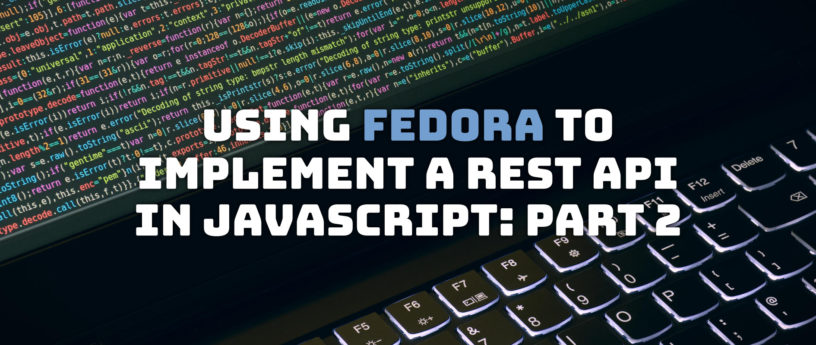6.7 KiB
Using Fedora to implement REST API in JavaScript: part 2
In part 1 previously, you saw how to quickly create a simple API service using Fedora Workstation, Express, and JavaScript. This article shows you the simplicity of how to create a new API. This part shows you how to:
- Install a DB server
- Build a new route
- Connect a new datasource
- Use Fedora terminal to send and receive data
Generating an app
Please refer to the previous article for more details. But to make things simple, change to your work directory and generate an app skeleton.
$ cd our-work-directory $ npx express-generator –no-view –git /myApp $ cd myApp $ npm i
Installing a database server
In this part, we’ll install MariaDB database. MariaDB is the Fedora default database.
$ dnf module list mariadb | sort -u ## lists the streams available
$ sudo dnf module install mariadb:10.3 ##10.4 is the latest
Note: the default profile is mariadb/server.
For those who need to spin up a Docker container a ready made container with Fedora 31 is available.
$ docker pull registry.fedoraproject.org/f31/mariadb
$ docker run -d --name mariadb_database -e MYSQL_USER=user -e MYSQL_PASSWORD=pass -e MYSQL_DATABASE=db -p 3306:3306 registry.fedoraproject.org/f31/mariadb
Now start the MariaDB service.
$ sudo systemctl start mariadb
If you’d like the service to start at boot, you can also enable it in systemd:
$ sudo systemctl enable mariadb ## start at boot
Next, setup the database as needed:
$ mysql -u root -p ## root password is blank
MariaDB> CREATE DATABASE users;
MariaDB> create user dbuser identified by ‘123456‘;
MariaDB> grant select, insert, update, create, drop on users.* to dbuser;
MariaDB> show grants for dbuser;
MariaDB> \q
A database connector is needed to use the database with Node.js.
$ npm install mariadb ## installs MariaDB Node.js connector
We’ll leverage Sequelize in this sample API. Sequelize is a promise-based Node.js ORM (Object Relational Mapper) for Postgres, MySQL, MariaDB, SQLite and Microsoft SQL Server.
$ npm install sequelize ## installs Sequelize
Connecting a new datasource
Now, create a new db folder and create a new file sequelize.js there:
const Sequelize = require('sequelize'),
sequelize = new Sequelize(process.env.db_name || 'users', process.env.db_user || 'dbuser', process.env.db_pass || '123456', {
host: 'localhost',
dialect: 'mariadb',
ssl: true
})
module.exports = sequelize
Note: For the sake of completeness I‘m including a link to the related Github repo: https://github.com/vaclav18/express-api-mariadb
Let‘s create a new file models/user.js. A nice feature of a Sequelize model is that it helps us to create the necessary tables and colums automatically. The code snippet responsible for doing this is seen below:
sequelize.sync({
force: false
})
Note: never switch to true with a production database – it would drop your tables at app start!
We will refer to the earlier created sequelize.js this way:
const sequelize = require('../db/sequelize')
Building new routes
Next, you’ll create a new file routes/user.js. You already have routes/users.js from the previous article. You can copy and paste the code in and proceed with editing it.
You’ll also need a reference to the previously created model.
const User = require('../models/user')
Change the route path to /users and also create a new post method route.
Mind the async – await keywords there. An interaction with a database will take some time and this one will do the trick. Yes, an async function returns a promise and this one makes promises easy to use.
Note: This code is not production ready, since it would also need to include an authentication feature.
We‘ll make the new route working this way:
const userRouter = require('./routes/user')
app.use(userRouter)
Let‘s also remove the existing usersRouter. The routes/users.js can be deleted too.
$ npm start
With the above command, you can launch your new app.
Using the terminal to send and retrieve data
Let’s create a new database record through the post method:
$ curl -d 'name=Adam' http://localhost:3000/users
To retrieve the data created through the API, do an HTTP GET request:
$ curl http://localhost:3000/users
The console output of the curl command is a JSON array containing data of all the records in the Users table.
Note: This is not really the usual end result — an application consumes the API finally. The API will usually also have endpoints to update and remove data.
More automation
Let‘s assume we might want to create an API serving many tables. It‘s possible and very handy to automatically generate models for Sequelize from our database. Sequelize-auto will do the heavy lifting for us. The resulting files (models.js) would be placed and imported within the /models directory.
$ npm install sequelize-auto
A node.js connector is needed to use this one and we have it already installed for MariaDB.
Conclusion
It‘s possible to develop and run an API using Fedora, Fedora default MariaDB, JavaScript and efficiently develop a solution like with a noSQL database. For those used to working with MongoDB or a similar noSQL database, Fedora and MariaDB are important open-source enablers.
Photo by Mazhar Zandsalimi on Unsplash.
via: https://fedoramagazine.org/using-fedora-to-implement-rest-api-in-javascript-part-2/
作者:Vaclav Keil 选题:lujun9972 译者:译者ID 校对:校对者ID
